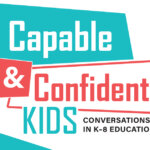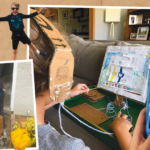






In Polarizing Times, Adults Can Help Kids Learn to Think for Themselves
Two years ago, a group of students at Castle High School in Newburgh, Indiana, created an after-school club as a place to express independent thinking on things they thought were important. They called it Young Voices. They wanted to address nonpartisan issues, ranging from mental health and school safety to getting a student on the school board.
Their newfound civic voice didn’t exactly thrill some adults. A city council member even made fun of them publicly. And some parents told kids to keep their opinions to themselves—even at home.
Young Voices member Olivia, who was 17 at the time, said, “I feel like you should be able to talk about current events with your family. But if I bring up my opinion, [my parents] are not comfortable thinking of the other side of the story.”
Patrick Barnard, an 18-year-old senior, said that he thought that this was what he was supposed to do: That is, use his brain to come to his own conclusions. But when it came time to share his thoughts, adults around him said he must have been brainwashed, or manipulated.
“So many kids feel so small, and we’re not small,” he said. “That’s why Young Voices is such a big deal.”
Uncertain times can make it hard to practice independent thinking.
Like the Young Voices, more young people are speaking out and saying they want to have a bigger say in decisions that affect them. Whether it’s school equity, climate change, mental health or other issues, the impact of young people’s collective voice is growing.
That’s not news to parents and teachers. Youth activism is on the rise, and social media has revolutionized how teens can organize and connect for causes online.
Developing independent thinking, judgement, and discernment is a prime goal of growing up and reaching adulthood, and parents and teachers can walk alongside young people and offer support.
But even as young people try to step up to the mic, we don’t always hear them. Current cultural conditions and social media make it more difficult to form values independently. From “cancel culture” to online conspiracy theories, young people need to wade through an overload of information, digital opinions, and misinformation to make their own way. And even though social media is the main source of current event topics, it can be an unreliable source of information.
Thinking for oneself isn’t just a developmental milestone on the way to adulthood, it’s also a crucial civic skill. Whether it’s reading the news, volunteering in the community, or voting, young people need the ability to understand current events. They also need to see how things affect them. They need to be able to decide what their values are and how to articulate those values.
What’s the best way for adults to help kids not just follow the crowd, but form their own opinions? How can adults encourage independent thinking in kids?
Keep kids tethered to the truth with facts and reliable sources of information.
One of the most important ways to help guide young people practice independent thinking in forming their own ideas is to make sure those ideas are supported by truthful information. This is hard to come by in the digital age. Check out this article on media literacy.
Online misinformation is one of the biggest threats to the health of democracy. According to recent reports, the threat is getting more serious. Sites that spout conspiracy theories have millions of followers and are gaining traction on social media. It’s crucial for parents to talk to young people about what they see on TikTok and Instagram while steering kids toward reliable sources of information. Here’s a site that ranks media bias, which I reference frequently when talking about this subject.
Thinking about anything requires a baseline of knowledge. Parents and teachers often say they want young people to engage in critical thinking, but cognitive scientists explain that it’s impossible for the brain to critically think about a topic it knows nothing about. Critical thinking can only happen when one has enough information, whether it’s history or current events, to think about. That’s why it’s so important that schools emphasize knowledge, especially in elementary school.
Lastly, it’s up to adults to help young people develop good judgement about what they see on TikTok or Instagram. News items can be complex. It takes both practice and knowledge to recognize whether information is biased or tells part of a story.
Give young people space to try out their thoughts and ideas.
When Irshad Manji was 14 years old, she asked “too many questions” during her Saturday religious school, and they kicked her out.
Irshad, author of Don’t Label Me and Let Grow’s director of courage, curiosity and character, walked the long way home to think about just how to present this bad news to her mother. But instead of demanding she go back and beg for forgiveness, her mother asked for something else. Since the school no longer welcomed her, Irshad’s mother said she needed to think about what might be a good way to spend those hours instead.
“The fact that she did not demand that I crawl back and ask for forgiveness, and allowed me to figure this out for myself with the expectation that I will be thoughtful, and not impulsive or rash,” Irshad said, made all the difference. Her mother trusted her.
Knowing she couldn’t outsmart her mother and just head to the roller rink, Irshad created a plan. She offered to spend her Saturday hours at the library, reading up on religions and cultures. Her mother approved. Irshad credits her mother with helping her develop a fiercely independent point of view. Her mother was there for her but was not going to tell her what to think.
The process makes all the difference.
Independent thinking doesn’t just spring up on its own; like a garden, it needs tending. But it’s up to adults to provide a space where young people can develop their ideas. Child psychologist Maureen Healy, author of The Emotionally Healthy Child, said that if adults want to raise children who think for themselves, they need to create the space for young people to try on new ideas and identities, a space where different perspectives are appreciated and tolerated.
Sometimes, it’s not easy. Young people can change opinions often, and mistakes will be made. But it’s the process that’s valuable.
“Being able to help your [child] articulate their perspective is very valuable, especially if they feel strongly about some topic,” Healy wrote in an email. “With parents, I would recommend they do their best to stay open-minded and supportive of their child ‘trying on’ different political perspectives and guiding them to take inspired action in safe and empowering ways.”
Teach kids to embrace listening to different points of view.
Like the parents of Young Voices students in Indiana, in times of uncertainty adults might think it’s safest to avoid hashing out ideas and airing opinions on controversial topics. But parents and teachers should give young people a chance to talk—and listen—about the issues and topics that matter to them.
For example, research has shown that classrooms where students engage in conversations about difficult and controversial topics produce more engaged adult citizens than classrooms that don’t.
In this vein, a high school librarian in Nashville, Tennessee, has made talking civilly about difficult topics a popular lunchtime club. Amanda Smithfield’s Project Civ America asks young people to sit down together and talk about some of the knottiest problems, and then, most importantly, listen to people who disagree with them.
Project Civ is not a debate club; the point is how to wade through disagreement with everyone’s dignity intact. One of the best ways to disagree, Smithfield said, is simply to really listen to what others are saying. “We’re having a conversation,” Smithfield told me in Building Better Citizens, “and giving everyone a chance to hear and consider opinions that are different from their own.”
Eventually, we start to listen and understand others.
Learning to listen to others is just as important as learning to express your opinions. This is especially true when it comes to family and friends. “Younger people that learn how to actively listen to people about their life experiences and background are building strong relationships,” psychologist Healy said. “Ultimately, this can help them understand differing perspectives—political or otherwise.”
When it comes to listening, Irshad said young people should take after martial arts master Bruce Lee. He says, “Be like water,” so stay nimble and agile in their beliefs, instead of rigid and dogmatic. Gain trust in others by truly listening, which then opens up an opportunity to share a different point of view.
Groups like Young Voices are giving young people a chance to think for themselves. Member Jack Brown said he joined the group because of the possibilities to expand his thinking.
“My whole life, I’ve had my beliefs, but they’re not popular,” he said. “I came to this group because I want to hear others, I don’t just want to hear what I want to hear. Then I can learn.”



Add your comment now using your favorite social account or login to your LetGrow account.